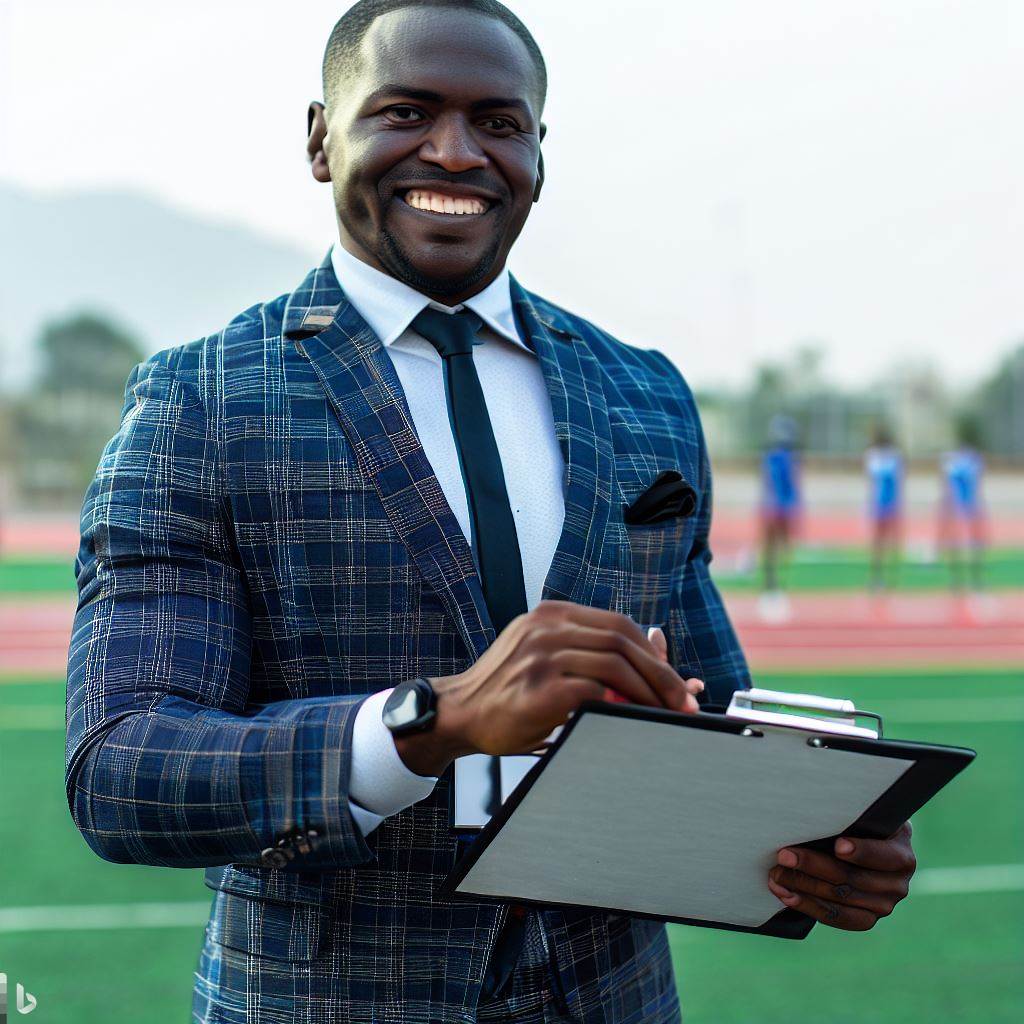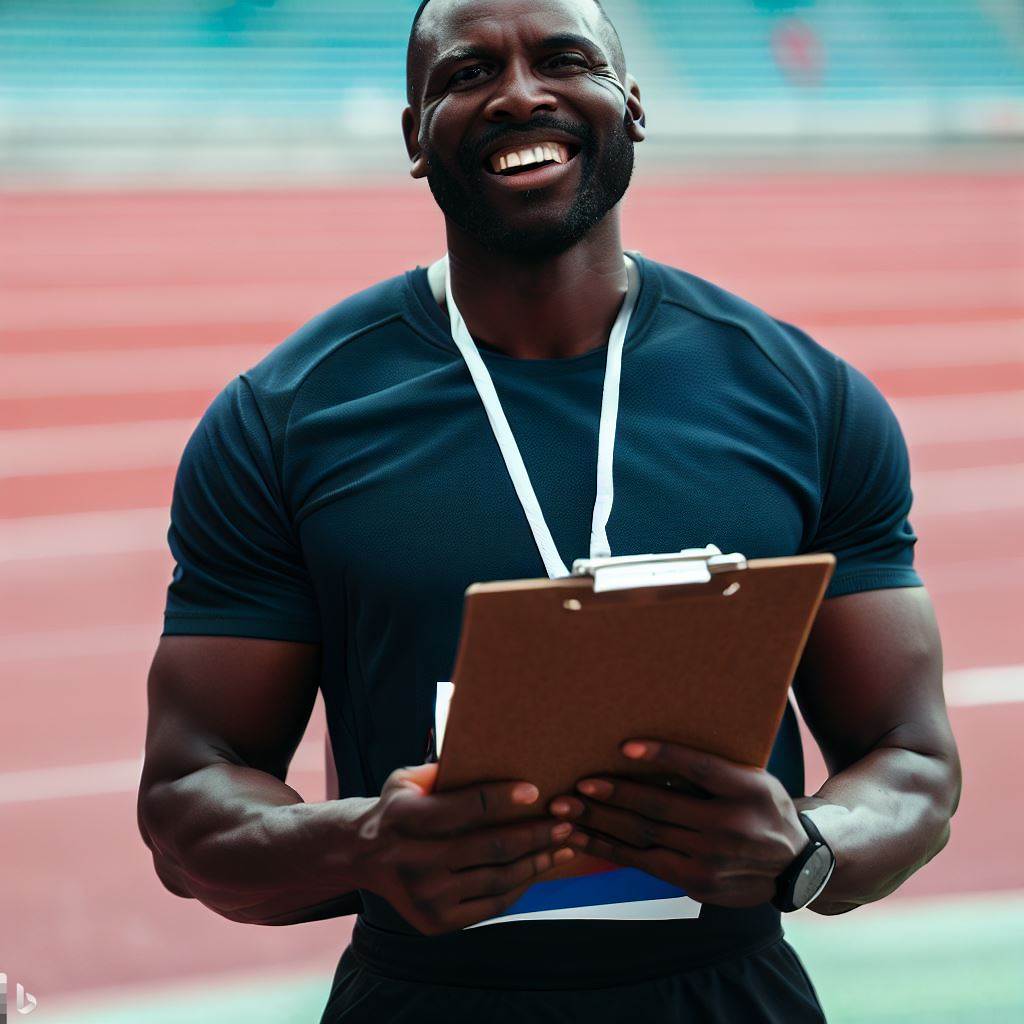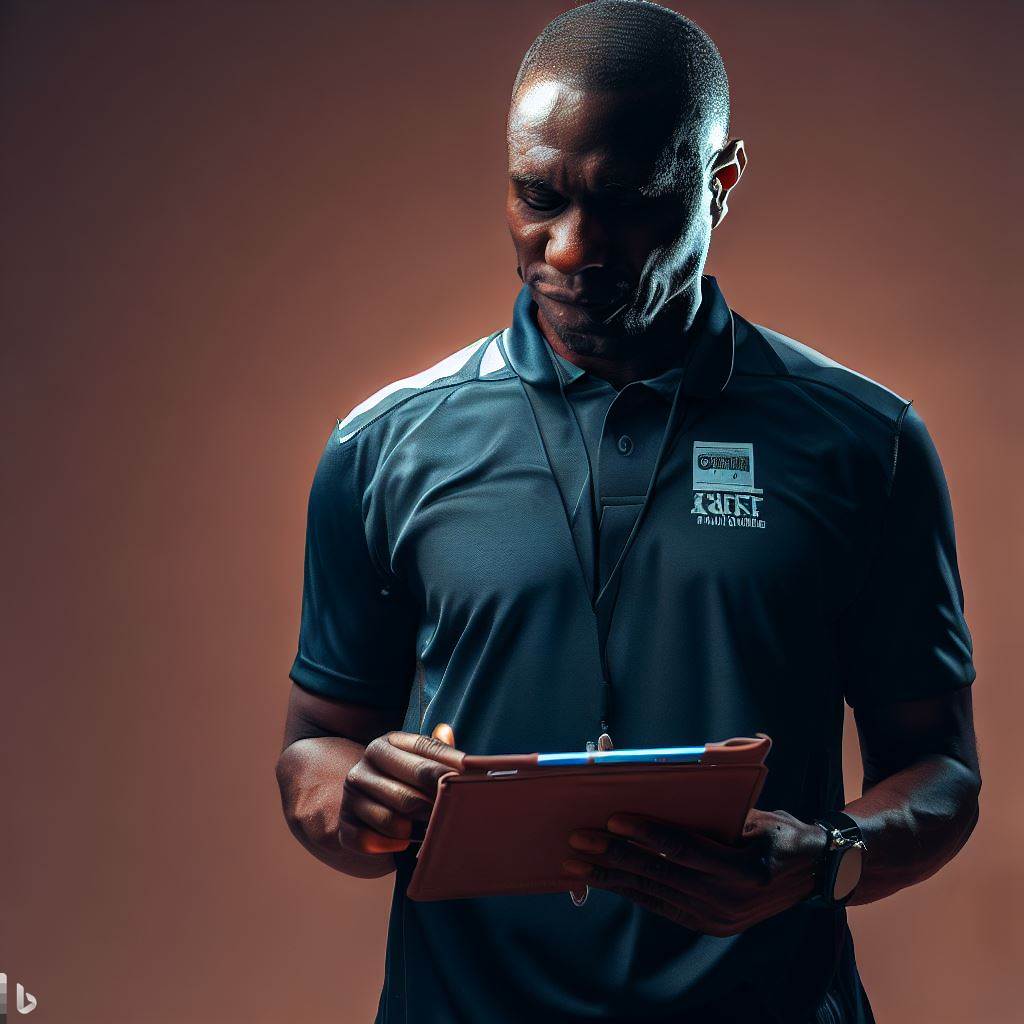Introduction
Athletic directors play a crucial role in the development and success of sports in Nigeria.
They are responsible for overseeing and managing all aspects of athletic programs in schools, universities, and sports organizations.
In this article, we will explore the importance of athletic directors in Nigeria and provide an overview of the qualifications needed for this role.
A. Importance of Athletic Directors in Nigeria
Athletic directors are key figures in promoting and enhancing the sports culture in Nigeria.
They provide leadership and guidance to coaches, athletes, and other staff members, ensuring the smooth functioning of sports programs.
By coordinating activities and resources, they contribute to the overall growth and excellence of sports in the country.
B. Overview of the Topic
In Nigeria, the role of an athletic directors requires a unique set of qualifications and skills.
They should have a strong background in sports management, understanding the principles of coaching, sports administration, and event organization.
Furthermore, they need to possess excellent communication and interpersonal skills to foster positive relationships with stakeholders, including athletes, coaches, parents, and school administrators.
To be an effective athletic director, knowledge of financial management, fundraising, and budgeting is essential.
They must be able to secure sponsorship and allocate resources efficiently to support athletic programs.
Additionally, understanding the legal and ethical aspects of sports is crucial to ensure compliance with regulations and maintain a safe and fair sporting environment.
In review, athletic directors are vital to the success and growth of sports in Nigeria.
Their role encompasses various responsibilities, including leadership, management, and organization.
By possessing the necessary qualifications and skills, they can contribute significantly to the development of a vibrant sports culture in the country.
Educational Qualifications
In order to become an Athletic Director in Nigeria, there are certain educational qualifications that are required.
These qualifications ensure that individuals have the necessary knowledge and skills to effectively manage sports programs and teams:
Having a bachelor’s degree in sports management, physical education, or a related field is the minimum educational qualification required for aspiring Athletic Directors in Nigeria.
This degree provides them with the fundamental knowledge and skills needed to manage and oversee athletic programs.
It covers a wide range of topics, including sports marketing, finance, event management, and leadership.
Additionally, individuals who possess a master’s degree in sports administration or a relevant discipline have a distinct advantage when it comes to securing higher-level positions in the field of sports management.
A master’s degree program provides further specialization and in-depth knowledge in areas such as sports law, sports governance, and strategic management.
The educational qualifications stated above not only equip individuals with theoretical knowledge but also offer practical experience through internships, research projects, and industry collaborations.
These opportunities enable students to apply their knowledge in real-world settings and develop the necessary skills to succeed as Athletic Directors.
Moreover, individuals pursuing these educational qualifications often have access to networking opportunities with industry experts and professionals.
This exposure enables them to gain valuable insights, industry connections, and mentorship, which are crucial for career development in the field of athletic administration.
While educational qualifications are essential, it is worth noting that practical experience and a strong background in sports are also highly valued attributes for Athletic Directors in Nigeria.
Previous experience working in sports administration, coaching, or as an athlete provides individuals with firsthand understanding of the challenges and dynamics of the sports industry.
In essence, the educational qualifications required for Athletic Directors in Nigeria include a bachelor’s degree in sports management, physical education, or a related field, along with a preferred master’s degree in sports administration or a relevant discipline.
These qualifications provide a solid foundation of knowledge and skills necessary to effectively manage and oversee athletic programs in Nigeria.
Read: Networking for Athletic Directors: Opportunities in Nigeria
Professional Experience
In selecting athletic directors in Nigeria, professional experience holds a pivotal role. These individuals manage and oversee sports programs nationwide.
They need qualifications and expertise.
Firstly, a minimum of 5 years’ experience in sports management or related fields is a must.
This extensive background imparts a deep understanding of industry trends and best practices, equipping them for program management challenges.
Leadership within athletic programs is also highly prized.
It showcases the ability to lead teams, make informed choices, and communicate effectively with athletes and staff, covering administrative tasks like budgeting and scheduling.
Deep knowledge of the Nigerian sports industry and its regulations is vital.
Familiarity with local sports associations, governing bodies, and specific rules ensures compliance, professionalism, and contributes to the sport’s growth.
Keeping abreast of sports industry trends and developments is crucial.
Attending workshops and seminars aids in continuous professional development, demonstrating a commitment to relevance and enhancing effectiveness.
Educational qualifications complement professional experience.
Many roles mandate a bachelor’s degree in sports management, physical education, or related fields. In some instances, advanced degrees like master’s or doctorates are preferred.
To sum up, athletic director roles in Nigeria are multifaceted and demanding.
They require a minimum of 5 years’ sports management experience, leadership skills, knowledge of Nigerian sports, and ongoing professional development, alongside relevant educational qualifications.
Read: Strength Coaching: A Women’s Perspective in Nigeria
Skills and Competencies
A. Strong leadership and management skills
Athletic directors in Nigeria must possess strong leadership and management skills to effectively guide and oversee athletic programs.
They are responsible for providing direction and setting goals for the athletic department.
This includes making important decisions, resolving conflicts, and motivating athletes and coaches.
B. Excellent communication and interpersonal skills
Effective communication is vital for athletic directors to collaborate with athletes, coaches, parents, and other stakeholders.
They need to clearly convey information, provide feedback, and address concerns.
Interpersonal skills are also important for building relationships and creating a positive and supportive environment within the athletic department.
C. Knowledge of budgeting and finance
Athletic directors must have a solid understanding of budgeting and finance to effectively manage the financial resources allocated to athletic programs.
They need to develop budgets, monitor spending, and make financial decisions that align with the goals of the department.
This includes seeking sponsorship opportunities and fundraising to support athletic activities.
D. Ability to develop and implement strategic plans
Athletic directors in Nigeria must have the ability to develop and implement strategic plans that enhance the quality and competitiveness of athletic programs.
They should have a deep understanding of the sports landscape and be able to identify opportunities for growth and improvement.
Strategic planning involves setting goals, evaluating performance, and adjusting strategies as needed.
E. Proficiency in computer and technology use
The use of computer and technology is essential for athletic directors to efficiently manage administrative tasks.
They need to keep records, prepare reports, and track the progress of athletes and teams.
Proficiency in technology also helps in communication, scheduling, and promoting athletic events through various digital platforms.
In general, athletic directors in Nigeria must possess a range of skills and competencies to effectively lead and manage athletic programs.
These qualifications include strong leadership and management skills, excellent communication and interpersonal skills, knowledge of budgeting and finance, the ability to develop and implement strategic plans, and proficiency in computer and technology use for administrative purposes.
By meeting these qualifications, athletic directors can contribute to the development and success of athletics in Nigeria.
Read: Training Tools: Nigerian Strength Coach Guide

Certifications and Additional Qualifications
Obtaining relevant certifications and additional qualifications can greatly enhance the effectiveness and credibility of athletic directors in Nigeria.
The following are some pertinent certifications and qualifications that can be beneficial:
A. Membership or certification from relevant sports administration organizations
Being a member of or obtaining certification from established sports administration organizations in Nigeria can demonstrate a commitment to professionalism and continuous learning.
Such organizations include the Nigerian Institute for Sports Administrators (NISA) and the Nigeria Olympic Committee (NOC).
B. Training in sports risk management and compliance
Athletic directors should undergo specialized training in sports risk management and compliance to ensure the safety and well-being of athletes and staff.
This training equips directors with the knowledge and skills to identify, assess, and mitigate potential risks associated with sporting activities.
C. First aid and CPR certification (preferred)
Having a valid first aid and CPR certification is highly recommended for athletic directors.
This qualification enables directors to respond effectively to medical emergencies and provide immediate assistance to injured athletes or staff members.
Acquiring these certifications and qualifications not only amplifies an athletic director’s professional profile but also highlights their commitment to maintaining high standards in sports administration.
With the skills obtained from these trainings, athletic directors can navigate the complexities of the role more effectively and enhance the overall sports experience in Nigeria.
Read: Creating a Brand: Strength Coaching in Nigeria
Personal Qualities
When it comes to being an athletic director in Nigeria, possessing certain personal qualities is essential.
These qualities play a crucial role in shaping the success and effectiveness of an athletic director.
Here are some key personal qualities needed:
- Passion for sports and commitment to athletes’ development: An athletic director must have a genuine love for sports and a deep commitment to the growth and development of athletes.
This passion will drive them to go above and beyond to ensure the success of the athletes and the sports program as a whole. - Ability to work well under pressure and meet deadlines: The role of an athletic director can be demanding and fast-paced. They must have the ability to handle pressure situations, make quick decisions, and meet deadlines effectively.
- Ethical and fair decision-making abilities: Being an ethical and fair-minded individual is crucial for an athletic director. They must be able to make unbiased decisions and ensure fair play and sportsmanship within the sports program. This includes promoting integrity and ensuring compliance with rules and regulations.
Apart from these key personal qualities, an athletic director in Nigeria should also be adaptable, resilient, and possess strong interpersonal skills.
The ability to adapt to changing circumstances and handle challenges with grace is vital in this role.
Additionally, being able to build and maintain positive relationships with athletes, coaches, parents, and the community at large is essential for fostering a strong and supportive sports program.
A successful athletic director understands that their role extends beyond just managing the operations of a sports program.
Current Trends and Challenges
A. The evolving role of athletic directors in Nigeria
- Athletic directors in Nigeria are now expected to take on a more proactive and strategic approach.
- They are no longer just responsible for managing sports programs, but also for developing athletes.
- There is an increased emphasis on creating a positive sports culture and promoting ethical behavior.
- Athletic directors must also be skilled in fundraising and marketing to secure financial support.
- They play a crucial role in ensuring the overall success and sustainability of sports programs in Nigeria.
B. Challenges faced in the Nigerian sports industry
- Funding is a major challenge, with limited financial resources available for sports programs.
- Infrastructure, including proper training facilities and equipment, is often inadequate in Nigeria.
- There is a lack of awareness and support for sports at the grassroots level.
- Political interference and corruption can hinder the progress of sports programs.
- There is a need for improved governance and transparency in sports administration.
C. Overview of strategies to overcome these challenges and adapt to current trends
- Athletic directors can explore alternative funding sources, such as sponsorships and partnerships.
- They should advocate for increased government support and investment in sports infrastructure.
- Developing grassroots programs and talent identification systems can help nurture young athletes.
- Stricter regulations and enforcement can help combat political interference and corruption.
- Athletic directors should prioritize professional development and stay updated with current sports management trends.
Gain More Insights: Networking for Fitness Nutritionists in Nigeria
Conclusion
The key qualifications needed for athletic directors in Nigeria include a bachelor’s degree in sports management or a related field, strong leadership and organizational skills, knowledge of sports rules and regulations, and experience in sports administration.
Hiring qualified professionals in sports management is of utmost importance as they can effectively manage sports programs, handle financial matters, and ensure the overall success of the organization.
Having competent athletic directors is crucial for the development of the Nigerian sports industry.
They play a vital role in identifying and nurturing talented athletes, creating opportunities for them, and improving the overall sports infrastructure in the country.
Furthermore, athletic directors are responsible for promoting sports at various levels, fostering a positive environment for athletes, and contributing to the growth of the sports industry in Nigeria.
To summarize, qualified athletic directors are essential for the advancement of Nigerian sports.
With their expertise and dedication, they can contribute significantly to the elevation of the sports industry and the success of athletes in the country.




